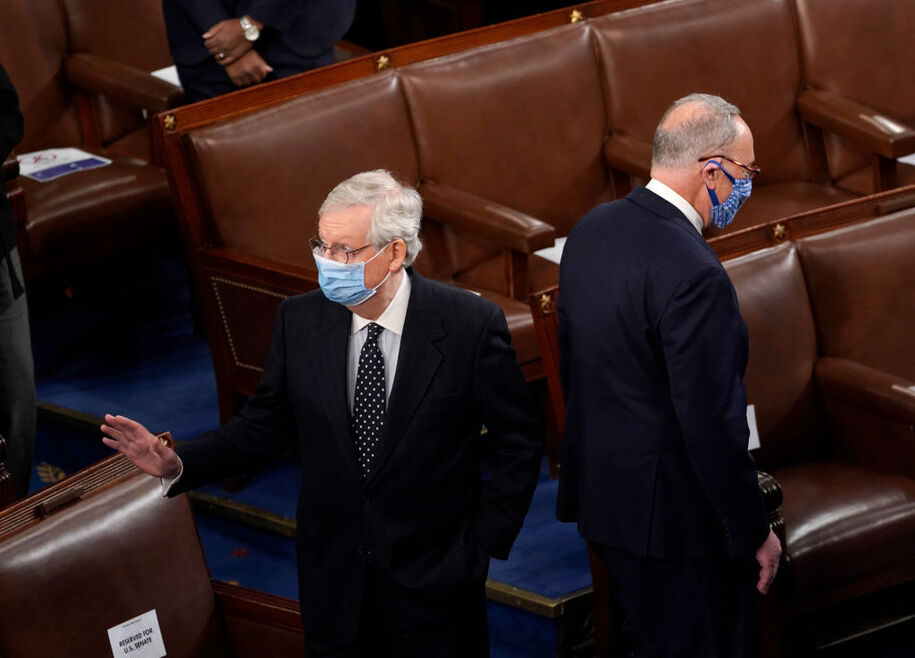
After President Biden Wednesday unveiled the first phase of his two-part infrastructure plan, House Speaker Nancy Pelosi quickly praised the $2 trillion package as "a visionary, once-in-a-century investment in the American people and in America’s future.”
Naturally, anything that good is bound to attract adamant opposition from the Republicans, the party of "this is why we can't have nice things."
Senate Minority Leader Mitch McConnell has spent the past couple weeks referring to the plan, which hadn't been announced yet, as a "Trojan horse," according to The New York Times. Here's a shocker: McConnell knew he was against it before he even saw the package. Once Biden finally released the outlines of it on Wednesday, McConnell was still against it.
“It’s called infrastructure, but inside the Trojan horse is more borrowed money and massive tax increases on all of the productive parts of our economy,” McConnell said. He also singled out tax increases as a nonstarter, saying he would likely oppose the bill “if it’s going to have massive tax increases and trillions more added to the national debt.”
Of course, McConnell was for ballooning the national debt before he was against it, helping Donald Trump pile an epic $7.8 trillion on the national debt during his four years in office. But not now—investing in the nation's crumbling infrastructure is just a bridge too far, so to speak, let alone the idea of trying to revolutionize the nation's economy for a new century.
The White House knew this was coming. Although Biden has already said he plans to invite Republicans into the infrastructure conversation, he also took an opportunity at his first press conference last week to remind Americans what Republicans are more than willing to bankrupt the country over tax cuts for the rich.
"Did you hear them complain when they passed close to a $2 trillion Trump tax cut—83% going to the top 1%? Did you hear them talk about that all?" Biden asked of GOP opposition to the COVID-19 relief bill. "When the federal budget is saving people’s lives, they don’t think it’s such a good idea," he said, adding that they are all in "when the federal budget is feathering the nest of the wealthiest Americans."
But the fight over an infrastructure package is shaping up to hew very closely to the battle lines drawn during the relief plan fight—with Republicans throwing peanuts from the cheap seats while Democrats go through a process of internal wrangling to pound out the details of the bill, or bills as it were. Passage will almost surely require Democrats to use reconciliation as Republicans race to line up against investing in the nation's infrastructure.
Of course, Republicans entirely blew their political fight against Biden's first major win—the $1.9 trillion relief package. They never developed a single line of attack and the bill grew more popular over time—an almost unprecedented feat. But the American public was already clamoring for more relief the day Biden set foot in the Oval Office, and Republicans were never able to make so much as a dent in the popular appeal of Democrats answering that need.
If McConnell is any gauge, Washington Republicans will likely grouse about the price tag of Biden's infrastructure plan but perhaps be most animated in their opposition to raising taxes. “The last thing the economy needs is a big whopping tax increase,” McConnell told reporters Thursday. Republicans may have ballooned the national debt during Trump's tenure, but the one bedrock principle they advanced with fervor was cutting taxes, particularly for their wealthy, corporatist donor class.
Marc Short, a former Mike Pence aide, is now heading the Coalition to Protect American Workers, a group formed specifically to mount an opposition campaign against any tax increases proposed by the Biden administration.
“When you are talking about tax hikes of this magnitude, I don’t see there being any Republican support on the Hill,” said Short, whose group hopes to raise some $25 to $50 million for their effort.
The problem for Republicans is that they once again appear to be fighting an uphill battle against public opinion. New polling released by Politico/Morning Consult this week showed that funding the infrastructure plan through tax increases on wealthy individuals and corporations actually make the measure more popular, not less. By a 2-to-1 margin, voters were more likely to support the plan if were funded by raising taxes on the wealthy and corporations than if it were funded without those tax increases. In fact, 57% of voters said they would be more likely to support the infrastructure plan if it were funded by tax increases on individuals making more than $400,000 a year, while 47% said they would be more likely to support the plan if it were funded by raising the corporate tax rate. Those who said tax increases would make them less likely to support the plan stood at just 17% and 21% respectively. In other words, tax increases on the wealthy—where Republicans are most likely to plant their flag of opposition—are overwhelmingly popular.
The upcoming infrastructure fight is sure to be more complicated than COVID-19 relief, partly because there're more moving parts and Democrats have to agree upon not only which priorities to fund but how they will change the tax code to fund them. Earning the overwhelming support of 70% of Americans, as Democrats managed to do with coronavirus relief, is likely to be difficult to match. But Democrats are starting in a somewhat similar position—Americans mostly favor infrastructure spending funded by tax increases on the wealthy and corporations while Republicans are mounting their opposition on those very same tax increases, which appear to among the most popular provisions in the plan.
Just as Biden said, Republicans only believe in federal spending when it's "feathering the nest of the wealthiest Americans."
They're OK when the rich are getting tax cuts, but not when bridges and roads are being rebuilt.








No comments:
Post a Comment